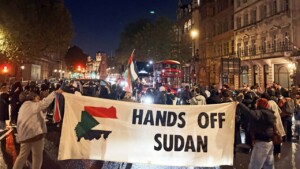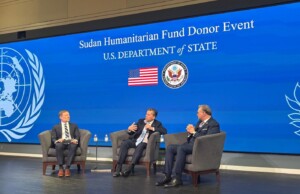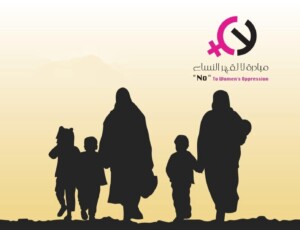Sudan CSOs respond to AU Peace and Security Council ‘final extension’
In response to the decision by the AU Peace and Security Council (AUPSC) on April 30 to grant Sudan’s Transitional Military Council (TMC), a ‘final extension’ of two months, to hand-over power to a transitional civilian government, or face suspension, extending a previous 15-day deadline, several Sudanese civil society organisations have signed a report on the situation in the country “in order to inform decision making by the AUPSC”.
 AUPSC meeting in Addis Ababa (Picture: AU)
AUPSC meeting in Addis Ababa (Picture: AU)
In response to the decision by the AU Peace and Security Council (AUPSC) on April 30 to grant Sudan’s Transitional Military Council (TMC), a ‘final extension’ of two months, to hand-over power to a transitional civilian government, or face suspension, extending a previous 15-day deadline, several Sudanese civil society organisations have signed a report on the situation in the country “in order to inform decision making by the AUPSC”.
The report, dated May 20, is entitled Assessing Progress Towards Civilian-Led Transitional Authority in Sudan.
I. Background and Summary
This report is submitted by Sudanese civil society groups in response to the communique of the 846th meeting of the African Union Peace and Security Council (PSC), in which the AU Commission Chairperson is requested to provide the PSC with periodic reports on the situation in Sudan in order to inform decision making by the PSC.
Civil Society Organizations (CSO) have an important role in the transitional arrangements. Accordingly, Sudanese CSO have submitted this report to the PSC on the occasion of the first 3- week reporting period following the 846th meeting of the PSC. This report is submitted in line with the Livingstone Formula and subsequent Maseru Conclusion which mandate civil society 2 organizations to submit reports to the PSC. This report reflects the views of the Sudanese Civil Society and their take on the progress on the transition as at 20 May 2019.
The report uses the milestones prescribed by the PSC in its 846th Communique to assess progress. These include (i) the need for incremental progress towards an agreement on (ii) an inclusive, holistic and consensual solution to the impasse in the country (iii) preservation of gains made thus far on Darfur, Blue Nile & South Kordofan (iv) important supportive actions by the Chairperson of the African Union along with those by other regional and international actors. Based on these considerations, the report makes recommendations on ways the African Union, along with the regional and international community can assist in making the transition as smooth as possible for the benefit of the Sudanese people in line with the Communique of the Chairperson of the AU Commission.
II. Situation in Sudan
Incremental Progress Towards Agreement The Transitional Military Council under the leadership of Lieutenant General Abdel Fattah El Burhan Abdelrahman committed on April 13, 2019 to transfer power to a civilian-led government, release all prisoners arbitrarily detained during the uprising, abolish all laws that restrict freedoms and stop vigilante attacks against peaceful demonstrators across the country. Negotiations between the Transitional Military Council and the Declaration of Freedom and Change Forces have currently stalled over an impasse regarding the constitution, membership and leadership of the transitional council, the application of Sharia Law and the continued presence of protestors at the sit-in sites.
Despite this commitment, there have been several attacks against peaceful demonstrators resulting in civilian casualties. This includes the use of live ammunition on peaceful protestors to clear in Nyala, South Darfur on May 4, 2019 that resulted in the death of a civilian and injuries to several others, shootings outside the military headquarters in Khartoum by assailants reported to be wearing military uniform, including that of Sudan’s Rapid Support Forces (RSF) on May 13 that resulted in at least five civilian and one military casualty and further attacks around the protest sites on May 15 that wounded at least eight civilians. These incidents demonstrate the urgent need for the Transitional Military Council to take steps to prevent the excessive use of force by security forces against protestors and the targeting of civilians by armed groups. The Transitional Military Council must be urged to uphold its duty and responsibility to ensure the protection of all Sudanese people and to investigate and take action against any armed groups that perpetrate attacks against protestors. Unless urgently addressed through impartial investigation into the reported incidents, further attacks against peaceful protestors pose a significant challenge to progress towards an agreement amidst fears that the demonstrations at Army Headquarters will be forcefully ended with the use of tear gas and live ammunition.
In addition to the attacks on protestors, civil society is also concerned by actions and decisions not taken in good faith or demonstrating the political will towards restoration of constitutional order in Sudan within the sixty days as directed by the Peace and Security Council. The suspension of negotiations for 72 hours following incidents of attacks against protestors in the previous week could further delay progress amidst a deterioration of the security situation around the protest sites 3 and across the country. Despite reports of progress, an agreement remains elusive. Civil Society requests the African Union Commission and the Peace and Security Council to insist that it will hold accountable any of the parties for actions not taken in good faith or unilateral declarations that may further delay progress towards an agreement in contravention of the spirit of the communique of the 846th meeting to “to pursue constructive dialogue to ensure the setting up of the Civilian-led Transitional Authority in the Sudan, without further delay.”
Towards Inclusive, Holistic and Consensual Solution
While there has been progress in the negotiations between the Military Transitional Council and the Declaration of Freedom and Change Forces, an inclusive, holistic and consensual solution as outlined in the communique of the of the 846th meeting can only be achieved through ensuring the participation of diverse stakeholders in the negotiations as well as the emerging structures and diverse voices from all regions of Sudan including Darfur, South Kordofan and Blue Nile States. Noting that the parties are still engaged in the process of negotiations to agree on the composition of the transitional council and other structures, we urge the Peace and Security Council to emphasize that the formation of the proposed structures should be inclusive of youth and women and that the negotiations should outline proposals for economic, security sector and other public reforms to address the situation in areas of Sudan still experiencing armed conflict and humanitarian situations most notably Darfur, South Kordofan and Blue Nile states.
Support from relevant regional, continental and international Actors imperative of a holistic approach
The decision by the African Union Peace and Security Council in its 846th communique to set a deadline of sixty days for the Transitional Military Authority to hand over power to a civilian-led Transitional Authority is a welcome and encouraging decision for the people of Sudan. The African Union Chairperson’s continued and sustained engagement both personally and through Special Envoy Professor Mohamed El Hacen Lebatt in Khartoum to support the African Union’s approach in collaboration with the United Nations, the European Union and the Troika (the United States of America, Norway and the United Kingdom) is also welcome.
However, civil society remains concerned that the process of democratic transformation in Sudan may be negatively affected unless there is cohesive and impartial engagement by foreign actors with The Military Transitional Council and the Declaration of Freedom and Change Forces (DCFC). Civil society calls on the African Union Commission and the Peace and Security Council to urge international stakeholders to support the transition to civilian rule and to discourage any engagement with the parties that would result in further divisions between military and civilians or promote outcomes in the negotiations other than those expressed by the Chairperson of the African Union the during this crucial transition period. Civil society reaffirms commendation the African Union for its firm leadership in responding to the situation in Sudan.
Actions by AUC Chairperson and PSC in Support of Transition
The people of Sudan have demonstrated their ability to overcome ethnic, religious and class differences and demand for political reform through peaceful protest. However, despite the directive by the Peace and Security Council to Sudanese stakeholders to “exercise maximum restraint and refrain from any act or declaration that could jeopardize the efforts so deployed in the 4 search for a sustainable solution to the current crisis”, there have been incidents of attacks against peaceful protestors by armed groups that have increased tension across the country and jeopardized progress towards reaching a negotiation between the Transitional Military Council and the Declaration of Freedom and Change Forces (DCFC). In this regard, we urge the Peace and Security Council to undertake a field mission to Sudan to assess the compliance of the parties to the negotiations to the African Union’s directives and identify further appropriate measures against individuals and entities whose acts, conduct and utterances compromise the search for a solution to the crisis in Sudan.
Recommendations
In summary, as civil society organizations in Sudan we are now concerned with the ways in which political negotiations are taking place and the resulting delays in the transition to a civilian-led transitional council. We are additionally worried about the use of force deployed to disperse the demonstrators, including in the conflict zones. Accordingly, the undersigned civil society groups therefore urge the African Union to Chairperson and Peace and Security Council to;
I. Condemn all attacks against protestors as well as any restrictions on civil liberties that continue to hamper progress in the negotiations.
II. Take necessary measures to ensure that negotiations are not suspended unduly.
III. Emphasize that the formation of the proposed structures should be inclusive of youth and women and that the negotiations should outline proposals for economic, security sector and other public reforms to address the situation in areas of Sudan still experiencing armed conflict and humanitarian situations most notably Darfur, South Kordofan and Blue Nile states.
IV. Further urge international stakeholders to support the transition to civilian rule and to discourage more categorically, any engagement with the parties that would result in further divisions between military and civilians or promote outcomes in the negotiations other than those expressed by the Chairperson of the African Union the during this crucial transition period.
V. Undertake a field mission to Sudan to assess the compliance of the parties to the negotiations to the African Union’s directives and identify further appropriate measures against individuals and entities whose acts, conduct and utterances compromise the search for a solution to the crisis in Sudan.
Signed:
Africa Centre for Justice and Peace Studies (ACJPS)
Al-Khatim Adlan Centre for Enlightenment, Sudan (KACE)
Darfur Bar Association
Democratic Thought Project, Sudan
Nuba Women for Education and Development Association -NuWEDA
Nubsud Human Rights Monitors Organization (NHRMO)
Regional Centre for Training and Development of Civil Society (RCDCS)
Skills for Nuba Mountains
Sudanese Development Initiative (SUDIA) Sudanese Organization for Research and Development (SORD)
Sudanese Rights Group (Huqooq)
The Strategic Initiative for Women in The Horn of Africa (SIHA Network)
The Sudan Democracy First Group (SDFG)











 and then
and then